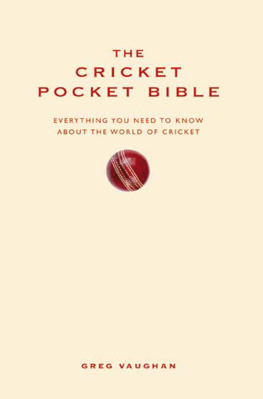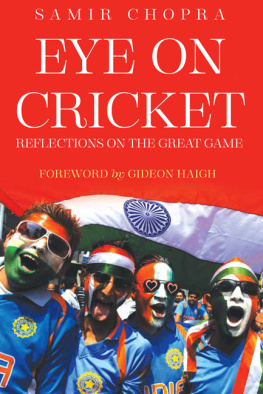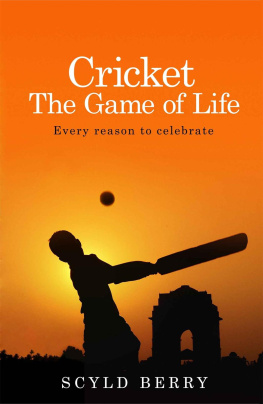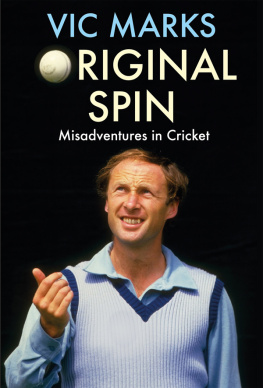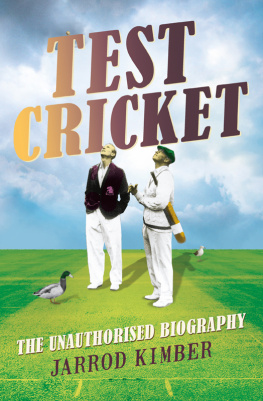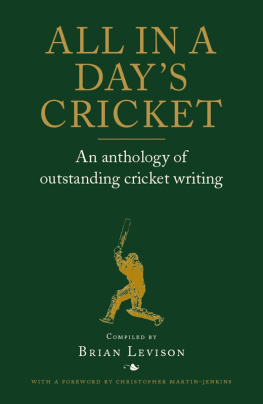Contents
Guide

First published in Great Britain in 2021 by Allen & Unwin
Copyright Vic Marks, 2021
The moral right of Vic Marks to be identified as the author of this work has been asserted by him in accordance with the Copyright, Designs and Patents Act of 1988.
All rights reserved. No part of this book may be reproduced or transmitted in any form or by any means, electronic or mechanical, including photocopying, recording or by any information storage and retrieval system, without prior permission in writing from the publisher.
Every effort has been made to trace or contact all copyright holders. The publishers will be pleased to make good any omissions or rectify any mistakes brought to their attention at the earliest opportunity.
Allen & Unwin
c/o Atlantic Books
Ormond House
2627 Boswell Street
London WC1N 3JZ
Phone: 020 7269 1610
Fax: 020 7430 0916
Email:
Web: www.allenandunwin.com/uk
A CIP catalogue record for this book is available from the British Library.
Hardback ISBN 978 1 83895 304 1
E-Book ISBN 978 1 83895 305 8
Printed in
10 9 8 7 6 5 4 3 2 1
[leave room for FSC logo]
Contents
Preface
WELCOME to a work in progress. Its time to find a title. That cant be too difficult, can it?
Just as they say never judge a cricketer by watching him in the nets, so we should never judge a book by its cover. But suddenly Im not so sure about that. When Javed Miandad was watching the teenage Wasim Akram in the nets in 1984 or Misbah ul-Haq was casting an eye over an even younger Naseem Shah in 2019, they both decided straightaway that they wanted to catapult these young fast bowlers into the national team. And clearly they were right to trust their gut instincts. It only took them a glance to reach their conclusions.
So perhaps the title and the cover matter after all, which sends the mind into a giddy top spin that prevents any coherent thought or the discovery of a decent title. Ah Top Spin? How about that? A sort of sequel to Original Spin, which I hope you enjoyed. I know there is a slippery slope out there populated by tired cricket book titles and I have started sliding down it. I am staring at some of them. For wicketkeepers The Gloves Are (always) Off; for former captains there are Final Declarations; those retiring gracefully sign off with Over and Out. Someone is always Following On. This is going to be trickier than I thought. The Americans seem to do this so much better: To Kill a Mockingbird, Catcher in the Rye, One Flew Over the Cuckoos Nest. Now these are proper titles and extraordinary books. Which came first, I wonder?
For the very first time Im experiencing some sympathy with the architects of The Hundred, who decided they had to come up with exciting titles for the eight squads they created in their brainstorming session in some darkened room at the offices of the England and Wales Cricket Board. Now I can just about see how, in desperation, they got to Welsh Fire for a squad that was supposed to embrace the counties of Gloucestershire and Somerset as well as Glamorgan and which, after the first draft of players had been completed in 2019, contained no Welshmen at all. Trent Rockets still sounds like a permatanned, soft-porn actor of the 1960s. As for the other names of the teams in the competition, Im afraid I cant remember them despite a barrage of publicity from the ECB.
The Hundred has not yet captured my imagination. It is a competition that has become increasingly derided and increasingly superfluous except for those employed at considerable expense to play, coach, broadcast and administer it, all of whom think it is a jolly good idea (and here are my bank details). Moreover, it is sponsored by a company that produces junk food in abundance at a time when obesity is an ever more dangerous and prevalent problem. As cricket seeks to restore its roots after the Covid-induced devastation of 2020, this is what Im supposed to be excited about.
What follows here was triggered by Covid-19. Dont worry, it does not dwell long on the pandemic or The Hundred, for that matter. The lockdown that began in March 2020 eventually drove me to the laptop and I had ample time to return there at the end of the year during the third lockdown. There was nowhere to go and not much to do. Soon after the start of the first lockdown I was asked to keep a very brief fortnightly diary. On 3 April I noted, The novelty [of the lockdown] soon wore off, as did the determination to read Shakespeare, Dickens and Joyce. Within a week all the fine ideas of self-improvement slithered away as a new routine evolved. Initially I became a news junkie, soaking up every detail; for a few days those 5 p.m. press conferences from Downing Street became compulsory viewing. But enthusiasm for that did not last long either as the passing on of vital guidance and information was increasingly replaced by barely concealed attempts to justify the handling of the problem.
I added that the 2020 edition of Wisden, published later this week, will not mention the disease because it erupted too late to be included. The glorious cricketing summer of 2019 is therefore unsullied. I decided that I would be better off turning my mind to something I knew about in an attempt to escape the deepening gloom that was evident from an entry of 2 May: What is clear and this may be a surprise to some of the arch-Brexiteers is that we are no better, and arguably worse, at dealing with this pandemic than our European neighbours despite the wisdom of Chris Whitty, the one I instinctively trust whenever I watch those afternoon press conferences.
So during that lockdown I started writing about cricket and not Covid (though I was briefly taken by the title Covids Metamorphoses). After six decades consumed by the game, this was my specialist subject. Whether what follows turns out to be therapy for me or entertainment for you remains to be seen. To achieve both outcomes would be a bonus.
Initially it looked as if there would be no cricket at all in the summer of 2020 so there would be plenty of time to contemplate various aspects of the game and to write about them. But then the ECB, despite its self-destructive obsession with The Hundred, reacted with a rare mix of flexibility and creativity that was in stark contrast to their attempts to woo women and children to their wondrous new competition. They undertook to deliver international cricket behind closed doors with Steve Elworthy, who had overseen what now seemed like the straightforward task of organizing a 50-over World Cup in 2019, to the fore. First and foremost the ECB needed the money from their lucrative TV deal to diminish the size of the losses caused by the pandemic, but there was also the nobler urgency to keep the game alive. And they did it.
They had to overcome a range of unprecedented obstacles, which began with persuading the government and the touring teams that cricket was safe and feasible behind closed doors. There was no cricket anywhere in the country until the second week of July, which left us correspondents endlessly debating whether it would ever happen and whether it would be worthwhile if it did. We rarely bothered to consider what might constitute Englands best bowling attack or who should open the batting, since such topics seemed of secondary importance and maybe there was no point in giving any attention to such minutiae anyway. There might be too many hurdles to overcome for any cricket to take place.


